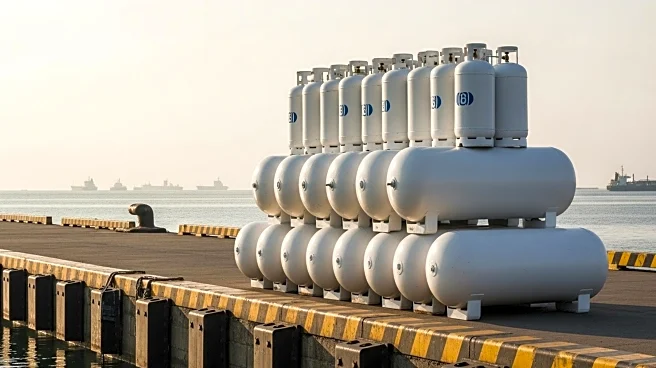What's Happening?
Ports across the United States are facing challenges due to grid instability and rising energy costs. To address these issues, many ports are turning to propane as a solution for on-site, scalable power. Propane offers a way to maintain critical operations without the need for expensive infrastructure upgrades, often resulting in significant cost savings. A recent example highlighted how one U.S. port saved over $1 million in a single year by adopting propane-powered solutions. An upcoming webinar, scheduled for October 16, will feature industry experts discussing the benefits of propane, including its ability to ensure uptime during grid disruptions and the deployment models for yard tractors and gensets.
Why It's Important?
The shift to propane power is significant for U.S. ports as it provides a reliable and cost-effective alternative to traditional grid power, which is increasingly unstable and expensive. This transition not only helps ports reduce operational costs but also enhances their resilience against power outages. The adoption of propane can lead to substantial savings, as demonstrated by the port that saved over $1 million. This move could influence other industries facing similar challenges, promoting wider adoption of propane and potentially reshaping energy strategies across various sectors. Stakeholders such as port operators, energy providers, and policymakers stand to benefit from the insights shared in the upcoming webinar.
What's Next?
The upcoming webinar on October 16 will provide further insights into the practical applications of propane in port operations. Industry experts will discuss how propane can be deployed effectively to ensure continuous power supply and cost savings. This event may lead to increased interest and adoption of propane solutions among other ports and industries facing similar energy challenges. As more ports explore propane as a viable option, there could be a shift in energy strategies, potentially influencing policy decisions and investment in alternative energy sources.
Beyond the Headlines
The use of propane in ports highlights a broader trend towards seeking alternative energy solutions in response to grid instability and rising costs. This shift may encourage innovation in energy technologies and infrastructure, promoting sustainability and efficiency. Additionally, the adoption of propane could have environmental implications, as it is considered a cleaner-burning fuel compared to traditional fossil fuels. This development may also spark discussions on energy independence and security, as ports and other industries seek reliable power sources that are less dependent on external grid conditions.









